A Bugaboo in the Hobby
A perennial target of Gary Gygax's ire in his "From the Sorcerer's Scroll" columns in Dragon was the desire to "improve" Dungeons & Dragons by making it more "realistic." In issue #13 of the magazine (July 1978 – around the time that the AD&D Players Handbook was first released), he speaks at some length about this topic.
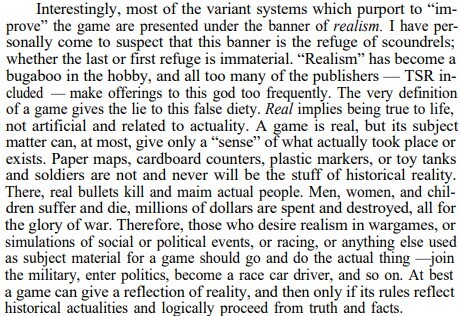 It's a shame that Gygax was so quick to employ strawmen in his jeremiads, because they often undermined the legitimate point he was trying to make. No game, no matter how finely detailed or complex in its rules, will ever adequately simulate reality, which is why the single-minded pursuit of realism is, as he calls it, a "false deity." This is a perfectly reasonable position for a game designer to take (though I may be biased in saying so, as it's close to my own position on the matter). Gygax had no need for overblown rhetorical flourishes, such as the suggestion that those who want realism in their games "join the military, enter politics, become a race car driver" to experience it – and I say this as someone who is broadly sympathetic to his perspective.
It's a shame that Gygax was so quick to employ strawmen in his jeremiads, because they often undermined the legitimate point he was trying to make. No game, no matter how finely detailed or complex in its rules, will ever adequately simulate reality, which is why the single-minded pursuit of realism is, as he calls it, a "false deity." This is a perfectly reasonable position for a game designer to take (though I may be biased in saying so, as it's close to my own position on the matter). Gygax had no need for overblown rhetorical flourishes, such as the suggestion that those who want realism in their games "join the military, enter politics, become a race car driver" to experience it – and I say this as someone who is broadly sympathetic to his perspective.
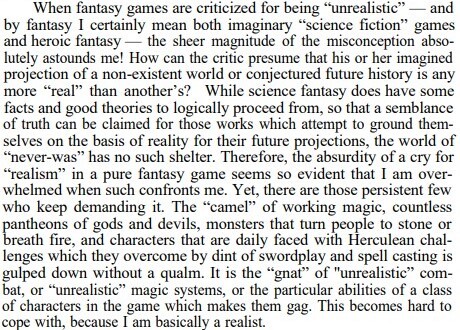 Here, however, I must part company with Gygax. Very few things are "pure fantasy," which is to say, utterly divorced from our real world. Even places like Edwin A. Abbott's Flatland obey recognizable and indeed logical rules that are intelligible even to three-dimensional beings. Most fantasy settings, even the most whimsical, contain innumerable elements that we must presume operate according to the laws of mundane reality, unless we are told otherwise. Does anyone really doubt, for example, that the inhabitants of a fantasy world must eat or sleep, just as we do? The mere presence of one or more fantastical elements in a setting does not suggest that the operation of everything in that setting follows its own unique – and unintelligible – rules. Again, this is desperate rhetoric.
Here, however, I must part company with Gygax. Very few things are "pure fantasy," which is to say, utterly divorced from our real world. Even places like Edwin A. Abbott's Flatland obey recognizable and indeed logical rules that are intelligible even to three-dimensional beings. Most fantasy settings, even the most whimsical, contain innumerable elements that we must presume operate according to the laws of mundane reality, unless we are told otherwise. Does anyone really doubt, for example, that the inhabitants of a fantasy world must eat or sleep, just as we do? The mere presence of one or more fantastical elements in a setting does not suggest that the operation of everything in that setting follows its own unique – and unintelligible – rules. Again, this is desperate rhetoric.
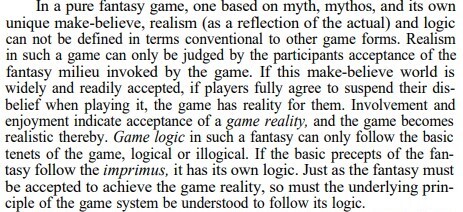 Gygax does a better job of explaining his position in this paragraph, though I still think he is (deliberately?) missing the point of those who want realism in their games. I fully agree with him that, once the logic of a setting is fully explicated and thereby understood by the players of a game, it can become a substitute for the logic of the real world within the game. I suspect most people reading this post have, at some point, been involved in a game session in which some matter was resolved by reference to the underlying "rules" of a setting's reality. That's a regular occurrence in my House of Worms campaign and indeed one of its great joys.
Gygax does a better job of explaining his position in this paragraph, though I still think he is (deliberately?) missing the point of those who want realism in their games. I fully agree with him that, once the logic of a setting is fully explicated and thereby understood by the players of a game, it can become a substitute for the logic of the real world within the game. I suspect most people reading this post have, at some point, been involved in a game session in which some matter was resolved by reference to the underlying "rules" of a setting's reality. That's a regular occurrence in my House of Worms campaign and indeed one of its great joys.
At the same time, I'm not completely certain that this is all that relevant to the concerns of those who want realism in, say, the combat system of their favorite RPG. What the advocates of realism generally want, in my own experience anyway, is a mechanical system that better reflects the way the things being modeled operates in the real world. Thus, a realistic combat system might take into account things like bleeding, broken bones, shock, and so on. D&D's combat system emphasizes not realism but ease and efficiency of play, which is a perfectly valid emphasis. That some might want a combat (or any other) system that more closely models reality is no cause for derision, even if the desire is at odds with Gygax's own preferences and the approach he adopted in his own design.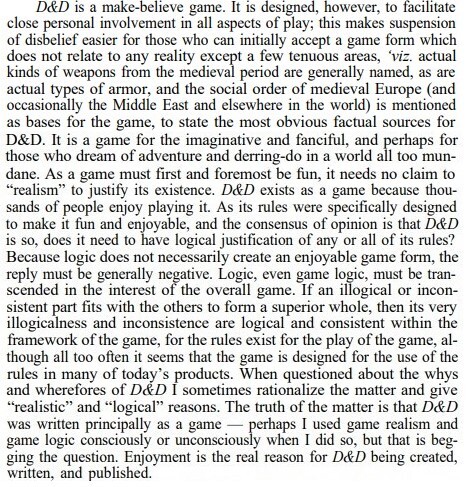 I could quibble with some of what Gygax says here, but, by and large, I think he acquits himself well here. That said, he still doesn't quite seem to understand why some people, even if they're only a minority, desire greater realism in their game system than D&D has on offer.
I could quibble with some of what Gygax says here, but, by and large, I think he acquits himself well here. That said, he still doesn't quite seem to understand why some people, even if they're only a minority, desire greater realism in their game system than D&D has on offer.
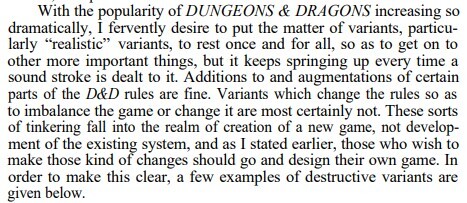 I agree with Gygax that, after a certain point, if you make enough changes to Dungeons & Dragons, you're not really playing Dungeons & Dragons anymore and you might as well be making your own game. We probably wouldn't have as many roleplaying games as we do if it others hadn't come to a similar conclusion on their own. Likewise, I readily accept the notion that D&D – or at least AD&D – was, in some sense, designed with particular goals in mind and that its rules, however seemingly haphazard they are in places, are intended to serve genuine purposes. Modifying or removing them without due consideration for their intended purposes can be detrimental to the working of the whole. The problem is that Gygax seemed to think that only he was in a position to determine which "additions to and augmentations of" D&D were fine and which were not.
I agree with Gygax that, after a certain point, if you make enough changes to Dungeons & Dragons, you're not really playing Dungeons & Dragons anymore and you might as well be making your own game. We probably wouldn't have as many roleplaying games as we do if it others hadn't come to a similar conclusion on their own. Likewise, I readily accept the notion that D&D – or at least AD&D – was, in some sense, designed with particular goals in mind and that its rules, however seemingly haphazard they are in places, are intended to serve genuine purposes. Modifying or removing them without due consideration for their intended purposes can be detrimental to the working of the whole. The problem is that Gygax seemed to think that only he was in a position to determine which "additions to and augmentations of" D&D were fine and which were not.
 It's a shame that Gygax was so quick to employ strawmen in his jeremiads, because they often undermined the legitimate point he was trying to make. No game, no matter how finely detailed or complex in its rules, will ever adequately simulate reality, which is why the single-minded pursuit of realism is, as he calls it, a "false deity." This is a perfectly reasonable position for a game designer to take (though I may be biased in saying so, as it's close to my own position on the matter). Gygax had no need for overblown rhetorical flourishes, such as the suggestion that those who want realism in their games "join the military, enter politics, become a race car driver" to experience it – and I say this as someone who is broadly sympathetic to his perspective.
It's a shame that Gygax was so quick to employ strawmen in his jeremiads, because they often undermined the legitimate point he was trying to make. No game, no matter how finely detailed or complex in its rules, will ever adequately simulate reality, which is why the single-minded pursuit of realism is, as he calls it, a "false deity." This is a perfectly reasonable position for a game designer to take (though I may be biased in saying so, as it's close to my own position on the matter). Gygax had no need for overblown rhetorical flourishes, such as the suggestion that those who want realism in their games "join the military, enter politics, become a race car driver" to experience it – and I say this as someone who is broadly sympathetic to his perspective.
 Here, however, I must part company with Gygax. Very few things are "pure fantasy," which is to say, utterly divorced from our real world. Even places like Edwin A. Abbott's Flatland obey recognizable and indeed logical rules that are intelligible even to three-dimensional beings. Most fantasy settings, even the most whimsical, contain innumerable elements that we must presume operate according to the laws of mundane reality, unless we are told otherwise. Does anyone really doubt, for example, that the inhabitants of a fantasy world must eat or sleep, just as we do? The mere presence of one or more fantastical elements in a setting does not suggest that the operation of everything in that setting follows its own unique – and unintelligible – rules. Again, this is desperate rhetoric.
Here, however, I must part company with Gygax. Very few things are "pure fantasy," which is to say, utterly divorced from our real world. Even places like Edwin A. Abbott's Flatland obey recognizable and indeed logical rules that are intelligible even to three-dimensional beings. Most fantasy settings, even the most whimsical, contain innumerable elements that we must presume operate according to the laws of mundane reality, unless we are told otherwise. Does anyone really doubt, for example, that the inhabitants of a fantasy world must eat or sleep, just as we do? The mere presence of one or more fantastical elements in a setting does not suggest that the operation of everything in that setting follows its own unique – and unintelligible – rules. Again, this is desperate rhetoric.
 Gygax does a better job of explaining his position in this paragraph, though I still think he is (deliberately?) missing the point of those who want realism in their games. I fully agree with him that, once the logic of a setting is fully explicated and thereby understood by the players of a game, it can become a substitute for the logic of the real world within the game. I suspect most people reading this post have, at some point, been involved in a game session in which some matter was resolved by reference to the underlying "rules" of a setting's reality. That's a regular occurrence in my House of Worms campaign and indeed one of its great joys.
Gygax does a better job of explaining his position in this paragraph, though I still think he is (deliberately?) missing the point of those who want realism in their games. I fully agree with him that, once the logic of a setting is fully explicated and thereby understood by the players of a game, it can become a substitute for the logic of the real world within the game. I suspect most people reading this post have, at some point, been involved in a game session in which some matter was resolved by reference to the underlying "rules" of a setting's reality. That's a regular occurrence in my House of Worms campaign and indeed one of its great joys. At the same time, I'm not completely certain that this is all that relevant to the concerns of those who want realism in, say, the combat system of their favorite RPG. What the advocates of realism generally want, in my own experience anyway, is a mechanical system that better reflects the way the things being modeled operates in the real world. Thus, a realistic combat system might take into account things like bleeding, broken bones, shock, and so on. D&D's combat system emphasizes not realism but ease and efficiency of play, which is a perfectly valid emphasis. That some might want a combat (or any other) system that more closely models reality is no cause for derision, even if the desire is at odds with Gygax's own preferences and the approach he adopted in his own design.
 I could quibble with some of what Gygax says here, but, by and large, I think he acquits himself well here. That said, he still doesn't quite seem to understand why some people, even if they're only a minority, desire greater realism in their game system than D&D has on offer.
I could quibble with some of what Gygax says here, but, by and large, I think he acquits himself well here. That said, he still doesn't quite seem to understand why some people, even if they're only a minority, desire greater realism in their game system than D&D has on offer.
 I agree with Gygax that, after a certain point, if you make enough changes to Dungeons & Dragons, you're not really playing Dungeons & Dragons anymore and you might as well be making your own game. We probably wouldn't have as many roleplaying games as we do if it others hadn't come to a similar conclusion on their own. Likewise, I readily accept the notion that D&D – or at least AD&D – was, in some sense, designed with particular goals in mind and that its rules, however seemingly haphazard they are in places, are intended to serve genuine purposes. Modifying or removing them without due consideration for their intended purposes can be detrimental to the working of the whole. The problem is that Gygax seemed to think that only he was in a position to determine which "additions to and augmentations of" D&D were fine and which were not.
I agree with Gygax that, after a certain point, if you make enough changes to Dungeons & Dragons, you're not really playing Dungeons & Dragons anymore and you might as well be making your own game. We probably wouldn't have as many roleplaying games as we do if it others hadn't come to a similar conclusion on their own. Likewise, I readily accept the notion that D&D – or at least AD&D – was, in some sense, designed with particular goals in mind and that its rules, however seemingly haphazard they are in places, are intended to serve genuine purposes. Modifying or removing them without due consideration for their intended purposes can be detrimental to the working of the whole. The problem is that Gygax seemed to think that only he was in a position to determine which "additions to and augmentations of" D&D were fine and which were not.
Published on September 16, 2022 09:00
No comments have been added yet.
James Maliszewski's Blog
- James Maliszewski's profile
- 3 followers
James Maliszewski isn't a Goodreads Author
(yet),
but they
do have a blog,
so here are some recent posts imported from
their feed.



